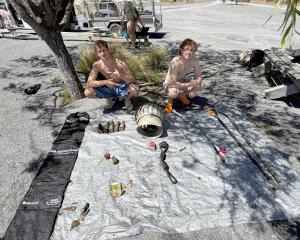
Their absence is likely because there was little destruction, if any — even though one day’s rainfall was the most in a century.
Otago soils and most forested slopes are very different from the East Coast where forestry has lost social licence. Post-storm slash smashed bridges and piled up on beaches.

It might have helped that coastal Otago’s heaviest rains are steady rather than torrential, although they fell on already sodden ground and lasted for at least 48 hours.
No wonder the forestry industry is appalled by the controversial Otago Regional Council draft land and water plan. Last October, the industry called requirements, notably for watercourse setbacks, "dire". The rules would wreck the business and cost hundreds of millions of dollars in restricted production and emissions trading credits. Despite subsequent modifications, the setback and resource consent demands remain catastrophic for forestry.
A spokesman, on behalf of owners of 125,000 hectares of Otago forestry, said there was no reason to expand on rules created through a separate nine-year process to set national environmental standards for commercial forestry.
Also, the council’s water quality reasoning on setbacks made no sense, as hundreds of studies showed, he said.
***
The importance of an independent "fourth estate" is indisputable for politics, government (including with the Otago Regional Council) and human rights.
Those who love their sport should also recognise the significance of outside analysis and opinion.
This point was underscored for Civis after the Black Ferns rugby team was run around and pushed around by a superior English team.
When sporting organisations are the source of "truth", expect more spin than a Shane Warne leg-break. They have direct interests and seek to sugarcoat performances as much as they think they can credibly get away with. Thoughtful and analytical followers want much more. Their love is deeper than superficial adulation, puff pieces or skirting around the negative or contentious.
In a New Zealand Rugby email, these were the teaser paragraphs to the report on the thrashing: "Despite a valiant effort, the Black Ferns couldn’t overcome the relentlessness of England in a hard-fought match in Canada.
"Down at the half, the Black Ferns showed heart, pulling within striking distance early, making England earn their points."
In contrast, here is the start of a follow-up report in the New Zealand Herald: "Four-time Rugby World Cup winner Monalisa Urquhart has slammed the Black Ferns and called for selection changes in the wake of their towelling at the hands of England.
"New Zealand conceded a record nine tries in the 49-31 WXV 1 hiding in British Columbia, marking the first time since 2021 the Ferns have lost three consecutive tests."
Which would you rather read?
As it is, sports reporters are easily drawn in, willingly or unwillingly, to be less independent than desirable. Maintaining distance fosters more balance and adds spice. Fresh ideas and less predictable evaluations are more likely.
Smart administrators recognise that sports benefit from robust reporting, even when that might frustrate them. It is usually better to be talked about than ignored.
It is often also said that All Black performance benefits from the demands, expectations and knowledge of a public willing to critique.
The Formula 1 Drive to Survive formula, broadcast through Netflix, is an exception to the need for independence. It has driven the sport to thrive and revved up attention. It is credited with creating many fans in the world’s biggest sports market, the United States.
The key was the series shone light on personality, clashes and drama.
New Zealand Rugby tried its hand with behind-the-scenes documentaries. They lacked controversy and edge. They had about as much impact as a Wallaby scrum.












